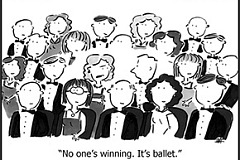 There’s a misconception in many business areas that you need to be tough to be successful. Sadly, for some people this translates into the belief that if they are unpleasant and self-centered in business, they will get ahead faster than nicer folk.
There’s a misconception in many business areas that you need to be tough to be successful. Sadly, for some people this translates into the belief that if they are unpleasant and self-centered in business, they will get ahead faster than nicer folk.
Now, there are scientific results that disprove this theory, so it’s time to shelve the thinking and put on your “nice guy” hat again. Who knows, it might even give you a competitive edge, help you hire the top talent, and improve your interpersonal relationships with employees and customers.
The Pathways to Power
Success in business often depends to a large degree on the person in charge. There are four main ways people achieve power, which are:
- Being assertive,
- Building alliances,
- Supporting others, and
- Competence in the job.
Any one of these (or a combination of them) can open doors to advancement, depending on the needs in the company at the time. Which methods are most successful and why? And, what pros and cons can you expect from them?
Becoming a Jerk
There’s a lot to be said for people who are assertive. We’re taught early in life that if we want something, we have to go out and get it. By its nature, being assertive is a positive concept, which enables someone to make their presence felt, earn relevance and significance, influence and empower others. Assertive people are often natural leaders, which makes them prime candidates for management.
Assertive vs. Aggressive
A fine line exists, however, between being assertive and being aggressive. Often, the individual oversteps and becomes increasingly dominant, causing fear and intimidation among other workers. This quickly gives rise to resentment and dislike, which are counter-productive to teamwork and company success.
Alliance Building
Then there’s alliance building. Most people work to earn a living, but once that primary need has been met, other factors come into play. Employee surveys show most workers want to be challenged by their occupation. They want to accomplish personal work goals, gain self-esteem through their successes, and get recognition from people they respect. [quotesright]Cultivating alliances gives them the network they need to achieve this, as well as prestige by association. [/quotesright]
Whether alliances are internal or external, they can lead to connections that help advancement in the future. However, successful alliances need to be mutually beneficial and grounded in authentic, shared interests or they are simply a form of “kissing butt,” which is a signature of being a jerk.
The Slower Route
Supporting others and being good at the job may be slower routes to success, but they are more solid and harder to question. Few people can take offense at or criticize someone who is helpful and makes the effort to assist others, or who does their work effectively and without drama.
A Surprise in Store
So, which of these pathways is more likely to lead to success than others? Here’s where it gets surprising. Two 14-year studies by the National Academy of Sciences show that, contrary to popular belief, disagreeable individuals are NOT more likely to attain power than agreeable individuals.
The reasoning behind this was that while the ability to intimidate should be more likely to elevate power, it also resulted in poorer interpersonal relationships that offset any potential advantage.
[quotes]Additionally, the studies showed disagreeable people can cause a lot of damage if they do attain positions of power.[/quotes] For example, CEOs who use aggression and bullying tactics create a culture of abuse, which often causes organizations to fail.
The Counterbalance of Power
This question about whether aggressive, selfish, and manipulative behavior helps people achieve power has interested psychologists and business strategists for many years, but until now there were few conclusive data available. The two long-term studies also proved other theories, including that:
- Individual differences have minimal impact. For example, gender, ethnicity, and organizational culture are less likely to affect a person’s rise to power and management success than their behavior.
- Disagreeable people who displayed more dominant and aggressive behavior were predicted getting more power, but this is canceled out by the fact that they engaged in less communal and generous behavior, which predicted attaining less power. So in sum, dominant, aggressive behavior failed to be a marker for increased power.
[quotes]At the same time, the studies showed those who exercised positive behavior were often elevated to positions of power by others, rather than having to compete for the positions.[/quotes] This is because they typically had stronger alliances based on supportive communal actions. In performance-oriented environments, job competence was also a higher predictor of successful advancement than any other criteria.
The Takeaway
In these days of tough-talking political players and “strong men” who use aggressive tactics to achieve their goals, it’s interesting to see scientific evidence that the good guys don’t come last, any more than the tough guys win all the time.
[quotesright]For business owners, the correlation is clear: you are more likely to see successful results by using positive reinforcement and pleasurable behavior than by being nasty.[/quotesright]
Factoring this into your own actions as well as your requirements for employees can give you a better chance at success than employing the dynamic, aggressive, A-type/driver personality who is demanding to be appointed.
Reference: “People with disagreeable personalities (selfish, combative, and manipulative) do not have an advantage in pursuing power at work” by Cameron Anderson, Daron L. Sharps, Christopher J. Soto and Oliver P. John, 31 August 2020, Proceedings of the National Academy of Sciences.
Dig deeper:
https://nyln.org/assertive-behaviour-pros-and-cons-list
https://www.thebalancecareers.com/why-you-need-allies-at-work-1916860














